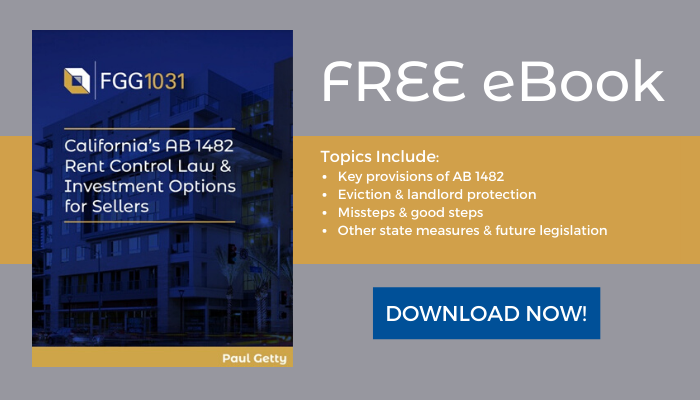Who wins and who loses post Coronavirus?
As SEEN in:
The COVID-19 pandemic has spared no person, business, or industry with the emotional and economic pain it has inflicted. Where businesses and individuals have contractual obligations with one another, questions of financial commitments often arise, raising a combination of legal and moral concerns to which there are often few immediate solutions. Perhaps there is no better example of this situation today than the relationship between home and apartment renters and their landlords.
In FGG’s previous post on this topic, we mentioned that many states including California are operating under executive orders that prohibit evictions for renters who can substantiate their inability to make rent payments due to the financial impacts of the coronavirus. And while these actions may provide some form of financial relief for renters, we also discussed the challenges landlords face in their current loss or reduction of income and their own obligations.
So, as we continue to adapt to a world struggling to understand the next steps in dealing with the virus and with some states, counties, and cities beginning to open-up, it’s worth speculating on the eventual outcome of the tenant-landlord relationship. Will there be winners and losers, or simply survivors? How long will it take before we can return to a state of normal? Or will we ever? There are no clear answers to these questions, but those who are best informed are likely to be the ones best protected, so keeping a pulse on the changing environment is smart.
First, it is helpful to understand that state and local governments as well as the U.S. Department of Housing and Urban Development have issued eviction and foreclosure moratoriums to protect renters and homeowners from losing their housing during this pandemic. But these measures vary widely from one state or municipality to another and they offer different degrees of protection in both length of time and in scope.
A collaboration between the Eviction Lab and Columbia Law School’s Professor Emily Benfer, has created a scorecard designed to distill the myriad of emergency orders and declarations that have gone into effect across the country and provide a state-level view of all rules and legislation related to eviction protection.
The importance of understanding these variations cannot be overstated. For example, on April 30, 2020, the City of Santa Monica, California issued a revised emergency order extending the end date for the moratorium from May 31 to June 30, 2020. In addition, it extended from six to twelve months the time for residential tenants to pay rents that were unpaid during the moratorium period due to financial impacts of COVID-19.
Conversely, at the time this article was written on May 21, 2020, the state of Texas had not extended its moratorium on evictions, which by law, were set to expire on May, 18, 2020. That inaction may have left a large percentage of the state’s 1.3 million recent unemployment claimants unprotected from potential eviction action.
For landlords seeking to protect their ownership and rental income while still meeting their own obligations for mortgages, insurance, utilities, and taxes, there has been little, if any, government support. Landlords have been encouraged to engage early and often with tenants who have been unable to make rent payments and to work out compromises which could include:
- Temporary rent reductions
- Deferred rent with lease extensions
- Deferred rent with revised lease amortization
Still, these actions, while perhaps beneficial in the long run, do not help with short-term needs and obligations. Resources like the National Apartment Association and state-specific organizations like the California Apartment Association (CAA) can be beneficial for landlords seeking guidance on how they can protect their interests in the same way renters want to.
In fact, the CAA is encouraging members to act by notifying their Congressional representatives and encouraging them to provide support to landlords in the next COVID-19 relief package. The CAA highlights the fact that federal response to this point has neglected investment property owners in several important ways including:
- The federal mortgage forbearance provided under the CARES Act only applies to loans with federal backing. This does not help most rental housing providers in California
- The Paycheck Protection Program does not aid rental housing providers who are considered mere “passive investors"
- Other federal loan programs are not sufficiently funded and do not help mom and pop landlords stay in business.
We continue to hear the phrase (too often), “We’re all in this together.” As it relates to exposure to the virus, that may be somewhat true. But in relation to the economic impacts of COVID-19, renters and landlords have very different needs and issues they are confronting. Only by a collaborative and intentional effort of working together will each of these parties emerge on the other side of the pandemic on stable footing and with confidence to move forward.
For more information on this topic, please contact FGG1031 at info@firstguardiangroup.com. You can also schedule some time on Paul’s calendar.
Download our latest eBook, California's AB 1482 Rent Control Law & Investment Options for Sellers.









Your Comments :